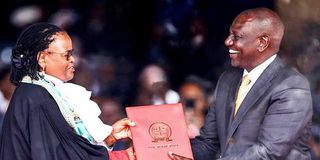Ruto remarks designed to erode gains made in liberation history

President William Ruto receives certificate from Chief Justice Martha Koome after taking oath of office on September 13, 2022.
The recent description of the Judiciary by President William Ruto as a tool that the Opposition is intent on using to derail his government’s agenda is reminiscent of the dark days of the 1980s and 1990s during Kenya’s search for democracy and institutional reforms. Such remarks constitute the height of impunity and are calculated, for all intents and purposes, to undermine the gains made in post-independent Kenya's liberation history.
The Judiciary occupies an independent tier of the governance framework of our nation. As such, this autonomous arm of government is a symbol of security among the citizenry. The unwarranted attacks on the Judiciary are a threat to personal as well as national security.
A return to the ignominious past in which the Judiciary was domesticated as a loyal lapdog of the Executive and in which Kenyans witnessed the systematic emasculation of the judicial arm of the government and consequent stifling of space for the divergence of opinion is unacceptable, given the strides the nation has made towards democratisation of institutional governance in Kenya.
Undermine the Constitution
As enunciated in our national anthem, justice is envisaged in our Constitution as our shield and defender. In this scenario, the Judiciary plays the critical role of umpire in dispute resolution and arbitration. Its independence is guaranteed under the Constitution. Attempts by President Ruto and his deputy to arm-twist and scoff at the Judiciary, the bedrock on which justice and liberty are founded and anchored, is an attempt to undermine the Constitution.
The motive for such a move aims to entrench an imperial presidency which is not answerable to the institutions that have been mandated to police us all, including the government. Respect for the rule of law requires that the best practices of transparency and accountability in a democracy dictate the choices, decisions and declarations that any leadership makes. Times are long gone when the Judiciary served at the behest of the Executive, a situation that engendered misrule arising from the application of the rule of the jungle where loyalty to an autocracy is actualized through coercion and intimidation.
Protection of the common good of the citizenry is the core mandate of the judiciary. Therefore, the sanctity of constitutional order must be defended and preserved at whatever cost. This has been the clarion call throughout the decades of the liberation struggle in Kenya which finds expression in the words of former Chief Justice David Maraga, “the greatness of a nation lies in its fidelity to its constitution”.
Multi-party democracy
Chroniclers of history would remind us that the Constitution underwent mutilation between 1966 and 1982 under the guise of amendment in order to meet the political specifications and prescription of the executive led by an insatiable presidency. For example, in June 1966, the constitution was amended to allow what is dubbed the “little general election” which was intended to checkmate the rise of Jaramogi Oginga Odinga's newborn outfit, KPU. Further, in June, 1982, Parliament plunged the country into darkness by amending the constitution to outlaw multi-party democracy and make Kenya a de jure one-party state under a benevolent dictatorship.
History teaches us that the constitution and judiciary have been the target of virulent attacks from the executive in its quest to buttress itself in power and control the people. The clamour for constitutional reforms after 1992 was informed by these excesses that an absolute presidential system had created through selfish and injudicious mutilations of the constitution that were obviously not designed for the common good and posterity. The sacrifices Kenyans have made since independence, which we attained 60 years ago from British rule, in order to defend the rule of law should be accorded respect. The judiciary has been mandated to protect, defend and preserve the sanctity of the Constitution in which the rule of law is enshrined and by which the President swore to rule the country.
Mr Imanyara is an advocate and a former MP





